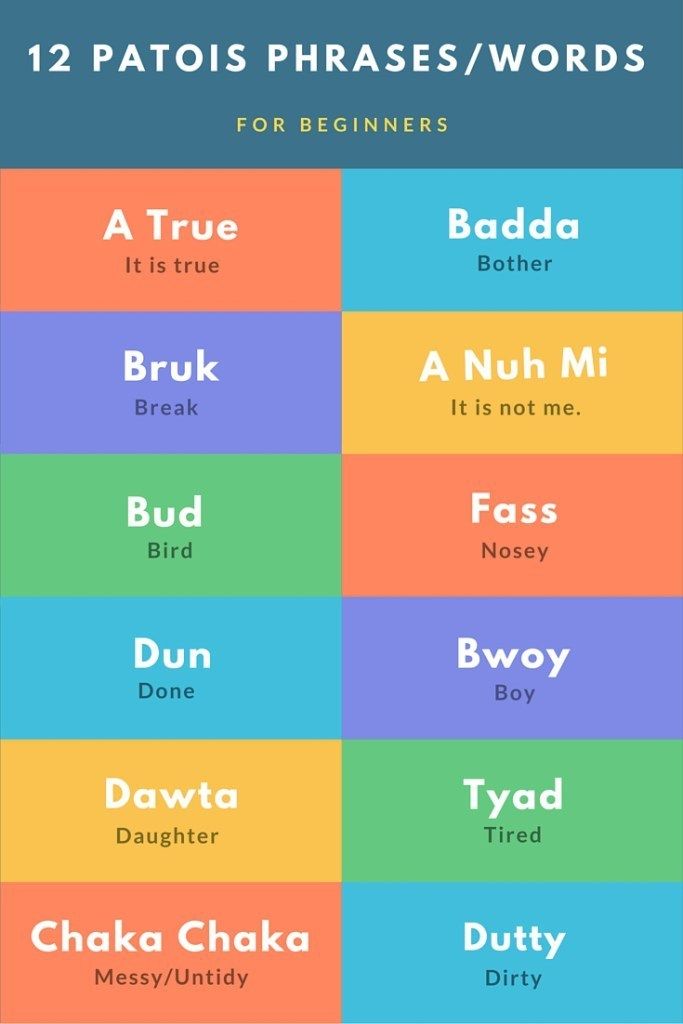Patois Bad Words: Understanding The Depth Of Jamaican Slang
Patois, often referred to as Jamaican Patois or Jamaican Creole, is a vibrant and expressive language that has evolved over centuries. While it beautifully encapsulates the cultural heritage of Jamaica, it also harbors a plethora of words and phrases that can be deemed offensive or vulgar. Understanding these "patois bad words" is crucial for anyone looking to delve deeper into Jamaican culture or communicate effectively with its speakers. The use of profanity in Patois reflects not just the linguistic creativity of its speakers, but also their emotional states and social interactions.
As with any language, the intent behind the use of such words can vary widely. Some may use these words in a playful or humorous context, while others may deploy them with serious intent or insult. Regardless of the context, it's essential to approach these terms with respect and awareness of their potential impact. This exploration into patois bad words will provide insights into their meanings, usage, and the cultural nuances behind them.
Furthermore, as the world becomes more interconnected, the influence of Jamaican culture—especially through music and media—has made its way into everyday conversations across the globe. As more people adopt elements of Patois into their language, understanding the implications of certain words becomes increasingly important. This article will guide you through the world of Patois, exploring its bad words, their meanings, and how they fit into the larger tapestry of Jamaican communication.
What are Patois Bad Words?
Patois bad words are essentially derogatory terms or phrases that are considered vulgar or offensive in Jamaican culture. Often rooted in everyday experiences, these words can range from mild insults to severe curses. They serve various functions in communication, including expressing frustration, anger, or humor. Some words carry a heavy cultural weight, reflecting historical struggles and social dynamics within Jamaican society.
Are Patois Bad Words Used Frequently?
Yes, patois bad words are used frequently in casual conversations, especially among friends or in informal settings. They can serve as a form of bonding or camaraderie, but their usage is often context-dependent. In more formal situations or among strangers, using such language can be viewed as disrespectful or inappropriate. Therefore, understanding when and how to use these words is essential for effective communication.
How Do Patois Bad Words Reflect Jamaican Culture?
The use of bad words in Patois often reflects the resilience and vibrancy of Jamaican culture. Many terms originate from the struggles of the Jamaican people, embodying their experiences and emotions. For instance, profanity may be used to express frustration with social injustices or to reclaim power over derogatory terms. This complex relationship between language and culture makes Patois bad words a fascinating subject for study.
What Are Some Common Patois Bad Words?
Here’s a list of some common patois bad words along with their meanings:
- Bway: A derogatory term for a man, often used to insult someone’s masculinity.
- Puss: A term that can mean "cat," but is often used in a derogatory manner to insult someone's character.
- Battyman: A slang term that can be used to insult someone's sexual orientation.
- Rass: A vulgar term often used to express frustration or anger.
How to Approach Patois Bad Words Respectfully?
Approaching patois bad words requires a degree of cultural sensitivity. If you’re learning Patois or engaging with Jamaican culture, consider the following tips:
- Always be aware of the context in which you are using these terms.
- Engage with native speakers to understand the nuances behind certain words.
- Use humor judiciously; not all contexts allow for playful use of bad words.
- Be prepared to apologize if your use of a term is misunderstood or taken offensively.
Can Patois Bad Words Be Used in Music and Art?
Absolutely! Patois bad words frequently appear in reggae and dancehall music, where they are often used to convey emotion and authenticity. Artists like Vybz Kartel and Buju Banton have used these terms to address social issues, personal struggles, and the realities of life in Jamaica. In this sense, bad words become a part of the storytelling fabric, enhancing the messages within their music.
What Are the Consequences of Using Patois Bad Words?
Using patois bad words comes with its consequences. In some situations, it can lead to misunderstandings or escalated conflicts. In others, it may foster camaraderie and connection among friends. However, it's crucial to recognize that not everyone will appreciate or accept the use of such language, particularly in formal settings. Thus, understanding your audience is key.
Can Learning Patois Bad Words Enhance Your Understanding of the Language?
Yes, learning patois bad words can enhance your understanding of the language significantly. These words often reflect the cultural context and emotional undercurrents of Jamaican communication. By familiarizing yourself with them, you gain insights into the societal norms, values, and issues faced by the Jamaican people. However, this knowledge should be approached with care and respect.
Conclusion: Embracing the Complexity of Patois
Patois bad words are more than just offensive terms; they embody a rich cultural history and emotional depth that is integral to Jamaican identity. Whether you are learning the language or simply wish to engage with Jamaican culture, understanding these words allows for a deeper appreciation of the nuances in communication. By approaching these terms with respect and cultural sensitivity, you can navigate the complexities of Patois and its vibrant expressions, including its bad words, with greater confidence and understanding.
Article Recommendations
- Is Bruno Mars Single
- Hdhub4u Netflix Download
- Tom Felton Married
- Violet Affleck
- Sophie Rain Spiderman Vid
- Christopher Daniel Barns
- Deephotlink
- Tracy Caliendo Net Worth
- Jan Bunch
- August Taylor




